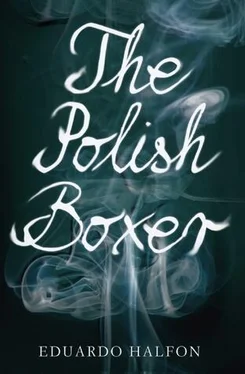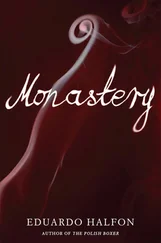Eduardo Halfon - The Polish Boxer
Здесь есть возможность читать онлайн «Eduardo Halfon - The Polish Boxer» весь текст электронной книги совершенно бесплатно (целиком полную версию без сокращений). В некоторых случаях можно слушать аудио, скачать через торрент в формате fb2 и присутствует краткое содержание. Год выпуска: 2012, Издательство: Bellevue Literary Press, Жанр: Современная проза, на английском языке. Описание произведения, (предисловие) а так же отзывы посетителей доступны на портале библиотеки ЛибКат.
- Название:The Polish Boxer
- Автор:
- Издательство:Bellevue Literary Press
- Жанр:
- Год:2012
- ISBN:нет данных
- Рейтинг книги:4 / 5. Голосов: 1
-
Избранное:Добавить в избранное
- Отзывы:
-
Ваша оценка:
- 80
- 1
- 2
- 3
- 4
- 5
The Polish Boxer: краткое содержание, описание и аннотация
Предлагаем к чтению аннотацию, описание, краткое содержание или предисловие (зависит от того, что написал сам автор книги «The Polish Boxer»). Если вы не нашли необходимую информацию о книге — напишите в комментариях, мы постараемся отыскать её.
marks the debut of a major new Latin American voice in English.
The Polish Boxer — читать онлайн бесплатно полную книгу (весь текст) целиком
Ниже представлен текст книги, разбитый по страницам. Система сохранения места последней прочитанной страницы, позволяет с удобством читать онлайн бесплатно книгу «The Polish Boxer», без необходимости каждый раз заново искать на чём Вы остановились. Поставьте закладку, и сможете в любой момент перейти на страницу, на которой закончили чтение.
Интервал:
Закладка:
I could have sworn the immigration officer at Belgrade airport was a character out of a Tarkovsky film. Maybe Andrei Rublev himself. He sat there smoking sternly and looking at me as if the night before I’d fucked his virgin daughter. I said I was sorry, just in case, and put my passport through the gap in the thick bulletproof glass, and without looking up he started to bend it, scratch it, tug at it, rub the laminated pages with his greasy thumb. Another officer was standing just behind him, watching the whole thing over his shoulder. The officer in the seat showed my passport to his friend, who grabbed it and bent it and scratched it and then went off somewhere with it. Maybe to some other supervisor who was watching it all from an even greater height, so that he could scratch it too. An ominous and infinite pyramid of Serbian scratchers, I thought. The first officer stayed in his seat, smoking. In English, his eyes fixed on my mouth, he asked me why I’d come to Belgrade, and for how long, and could he see my return ticket, and how much money did I have with me, and also was I carrying any plastic (that threw me, maybe because I was nervous, until he said credit card), and where would I be staying, and where was my letter of invitation. My what? Your letter, he repeated through the bulletproof glass, his cigarette clouding everything with smoke. My knees grew weak and I felt a gust of cool air in my stomach and I was convinced that in the airport of the former Yugoslavian capital you could clearly feel the earth’s rotation. My what? Letter, he shouted at me for the third time. But Vesna Pesić, the ambassador to Mexico, I stuttered, like a frightened little rabbit. I regretted it. The guy frowned and looked even sterner and in my mind I saw him pulling his stone-age revolver on me at any minute, then I imagined a small room, my body tied to a chair, the injection to make me tell them all my truths. The other officer came back with my passport and said something to his colleague in the chair. They both laughed. I felt a faint urge to cry. The officer stubbed his cigarette out in an ashtray already full of butts, and without a word he handed my passport and money and credit cards back through the gap in the bulletproof glass.
I came out of the airport, and I don’t know why — since Slavko Nikolić had told me about it in his last e-mail — but I was surprised to see everything covered in white. I was overcome by a deep sense of peace, of well-being, of harmony, a feeling that snow only arouses in people who live in the tropics. I opened my backpack for my hat and scarf. It was getting dark.
Just then, a pale woman with straw-colored hair said my name. I’m Zdena Lecić, Slavko’s girlfriend, she said in English, and held out her hand with a charming smile. And this is my father, Marko Lecić, as she indicated a short and stooped and cheerful man who immediately made me think of Bela Lugosi at the end of his life, or rather of a very cadaverous Martin Landau playing Bela Lugosi at the end of his life. I’m the driver, he said with a smoker’s voice and in an appalling English accent, and between chuckles and nasty coughs he clapped me hard on the back.
We got into a red Yugo that looked like it was about to collapse but that still worked pretty well, notwithstanding any tempting Yugoslav allegories. From the backseat, Zdena told me we’d go to her house first so we could all have dinner with Slavko, and that later her dad would take me to the apartment. The chauffeur, joked Marko, raising his hand. I was exhausted by the journey, but what could I do? Zdena explained to me that since her boyfriend had broken his leg, he’d decided to move in with them, as her dad’s house was a lot more spacious. It’s better for everyone, she added. I asked what Slavko did for a living, but they both stayed oddly quiet. Marko said something in Serbian and then said in English that before we did anything else we’d have to stop in at the police station. I thought he was joking. You have to register, he said seriously. Zdena laughed. How do you mean, register? All tourists have to register with the police when they arrive in the country, said Marko as we crossed a vast white bridge that reminded me of Milan’s last postcard. And all tourists have to register again before they leave the country, he added. Check in and check out, like in a hotel, I thought, but I didn’t say anything. We passed by one bombed-out building, then another, and another. I asked why they left them like that, why they didn’t knock them down. Supposedly, said Zdena, there are unexploded bombs inside. And there’s no money for it, said Marko as he parked the Yugo next to a pink building, a real bubblegum pink, a tutti-frutti pink: the only pink building in an utterly gray city. Is this the police station? I asked doubtfully. There was no sign outside. You need to show them your passport and plane ticket, Marko told me as he opened his door. I’ll wait for you guys here, said Zdena, still smiling. And so, documents in hand, I started walking toward the pink building, and it occurred to me, rather melodramatically, that the whole thing reeked of a goddamn ambush.
The inside of the police station was dirty and crumbling. It stank. Just like a Latin American police station, I thought. Marko asked a policeman something and the policeman pointed to a door at the end of a long corridor. Savski Venac, said the little label on the door. Suspicious, I asked Marko what it meant and he replied that it was the name of that area of the city. We went in. A policeman with a sour face got up and immediately, instinctively, put his hand on the revolver in his belt. Marko explained everything to him. The policeman took my documents. We have to wait outside, whispered Marko, and we went back out into the corridor. When we were sitting down, he told me not to worry, that everyone from the old regime was high-strung and grumpy. They still believe in intimidation, he added. A woman in pearls and an ostentatious white fur coat was also waiting outside. She looked downcast. She looked worn-out. I noticed that her makeup had run, as though she’d been crying or sweating or something. And I felt like I was in a Tarkovsky film again. Or even better: in a Fellini film — not the Fellini of tangos and flaming tridents, but the Fellini of every man for himself, gentlemen, galloping off on a sea horse. After a while, the same policeman came out, gave me back my documents, and off we went.
The Lecić house — a welcoming little homestead of clay and tiles built at the beginning of the last century — was on Puškinova Street, in an area of Belgrade known as Topčidersko Brdo. The apartment where they were going to put me up, Zdena told me as we got out the car, was very close by, just ten minutes away by taxi, in a neighborhood called Banovo Brdo.
That’s my dad’s studio, explained Zdena, pointing to a small building to one side of the house. We’re both painters, she said. Through the studio window, a few dogs started barking unenthusiastically, out of pure habit.
Slavko Nikolić was lying back on a sofa, his leg in plaster, a pack of Lucky Strikes in his hand. He was a big guy, maybe six six, with long, disheveled dark hair and a face that I thought was halfway between conceited and affectionate, like a piping hot rice pudding without enough cinnamon.
Sorry I couldn’t come and pick you up at the airport, Eduardo, he said in very broken Spanish, holding out his hand (a cyclops’s hand) and with a curious accent that was part Serbian and part Catalan. I told him this. Yeah, I lived in Barcelona nearly three years. In the Barrio Gótico. That’s where I learned Spanish. During the bombings. Sit down, sit down. Marko asked him for a cigarette and then, in English, said he’d go and see how dinner was doing. Slavko poured two small glasses of a light coffee-colored liqueur. It’s called Stomaklija, he said. Welcome, he said. Živeli, he said, and we downed it in one gulp. It tasted a bit like a mature rum, but not as sweet and with some sort of herb added. Rosemary, perhaps. I took a cigarette out of his pack. You a friend of Danica’s, then? he asked me, pronouncing Danica in such an odd way (all the syllables at once) that it took me a while to reply that yes, well, I didn’t know about friends, since I’d only met her recently. Unusually nervous, I asked him what he did for a living, but Slavko just gave a slightly patronizing, mawkish smile. She’s a good girl, Danica, he said, and then he was quiet. We smoked for a while in silence. This is for you, I said, and I handed him an envelope of money for the rent. Taking it, Slavko suddenly started lamenting the country’s economic situation, and the country’s political situation. Making a huge effort, I managed to follow for a minute or two, and then, as always happens when someone launches into some speech about politics and politicians and politicking, I started thinking about naked women. I don’t know why. Maybe just out of habit, maybe to keep myself occupied, maybe because I associate acts of power with sexual acts, maybe it’s got something to do with being Jewish.
Читать дальшеИнтервал:
Закладка:
Похожие книги на «The Polish Boxer»
Представляем Вашему вниманию похожие книги на «The Polish Boxer» списком для выбора. Мы отобрали схожую по названию и смыслу литературу в надежде предоставить читателям больше вариантов отыскать новые, интересные, ещё непрочитанные произведения.
Обсуждение, отзывы о книге «The Polish Boxer» и просто собственные мнения читателей. Оставьте ваши комментарии, напишите, что Вы думаете о произведении, его смысле или главных героях. Укажите что конкретно понравилось, а что нет, и почему Вы так считаете.












